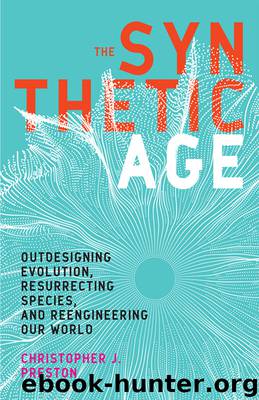The Synthetic Age by Christopher J. Preston

Author:Christopher J. Preston [Preston, Christopher]
Language: eng
Format: epub
Tags: Anthropocene; technology; nanotechnology; synthetic biology; biotechnology; biotech; de-extinction; climate engineering; environmental philosophy; transhumanism; technologies; new technology; new technologies; evolution; evolutionary; humanity; posthumanism; unnatural; emerging future; human activity; Nature; natural history
Publisher: The MIT Press
Published: 2018-04-10T00:00:00+00:00
• • •
The nineteenth-century English political philosopher John Stuart Mill once suggested two different ways of thinking about the word nature. One is to suppose that the term designates everything that happens on the earth that is consistent with the laws of nature—in other words, everything that is not supernatural. With this meaning, bears, waterfalls, whitebark pine seedlings bred in a nursery, Park Service employees killing hemlock trees, and CRISPRed mosquitoes are all part of nature. They do not transcend any physical laws. To transcend physics, one has to be either an angel or a god.
Mill's other way of thinking about nature supposes that nature includes everything that takes place on earth with the exception of what happens as the result of human intervention. In the first case, humans and all their works are entirely natural. In the second, nothing about humans or what they do can be thought of as natural. In this second case, every house, automobile, and vegetable garden is unnatural. Synthetic organisms are unnatural. By this definition, the activities of Jennifer Beck at Crater Lake and those of the gene-editing scientist are unnatural. Mill's distinction captures two polar opposite views of humanity. The first puts them entirely within nature. The second puts them entirely apart from nature.
Chris Thomas and Jennifer Beck might not care much about John Stuart Mill, but it would certainly boost their philosophical position if they both adopted Mill's first view of what counts as the natural. In this case, calculated human interventions—such as putting a box of butterflies in a car and driving them north or growing rust-resistant whitebark pines in a nursery before transporting them to a mountainside—do not negatively affect the butterflies’ or the pines’ naturalness. They were natural in their home range, and they remain natural after their human-assisted relocation to the new range.
The argument has some sense to it. Humans are a product of Darwinian evolution. Why should our actions stand out from those of the rest of nature? As biological beings, we are simply exploiting some of the capacities and talents that evolution blessed us with. Nothing unnatural there. This seems especially true when the motivation behind the action is to save a piece of nature from extinction rather than to exploit or destroy it.
Tempting as this sweeping account of naturalness is, it comes with certain costs. Such a position makes it possible to suggest that absolutely anything humans do is natural. Cutting down and paving over forests? Natural. Tossing empty beer cans into the creek? Natural. Creating toxic waste dumps? Extremely natural. Raising the planet's temperature and extinguishing gazillions of species? Oh so very natural. The all-encompassing first option Mill offers robs us of the ability to condemn any human behaviors on the grounds that they are unnatural. Human actions are always part of nature by definition.
The opposing view was adopted by Bill McKibben when he suggested that nature's independence from humans defines it. The natural world by definition has to be the world unmodified by humans.
Download
This site does not store any files on its server. We only index and link to content provided by other sites. Please contact the content providers to delete copyright contents if any and email us, we'll remove relevant links or contents immediately.
How to Do Nothing by Jenny Odell(3302)
A Forest Journey by John Perlin(3077)
The Plant Messiah by Carlos Magdalena(2935)
Babylon's Ark by Lawrence Anthony(2679)
The ESV Study Bible by Crossway Bibles(2551)
Energy Myths and Realities by Vaclav Smil(2493)
Fatal Storm by Rob Mundle(2216)
Abbey in America by Murray John A(2077)
Witness Tree by Lynda V. Mapes(1926)
Brokeback Mountain by Annie Proulx(1837)
Client Earth by James Thornton(1773)
Shadows on the Gulf by Rowan Jacobsen(1746)
Coming Back to Life by Joanna Macy(1719)
Cosmos by Carl Sagan(1718)
Mycelium Running: How Mushrooms Can Help Save the World by Paul Stamets(1687)
Water Rights and the Environment in the United States by John Burch(1687)
Ten Billion by Stephen Emmott(1658)
Ecological Intelligence by Daniel Goleman(1585)
The overachievers by Robbins Alexandra(1580)
